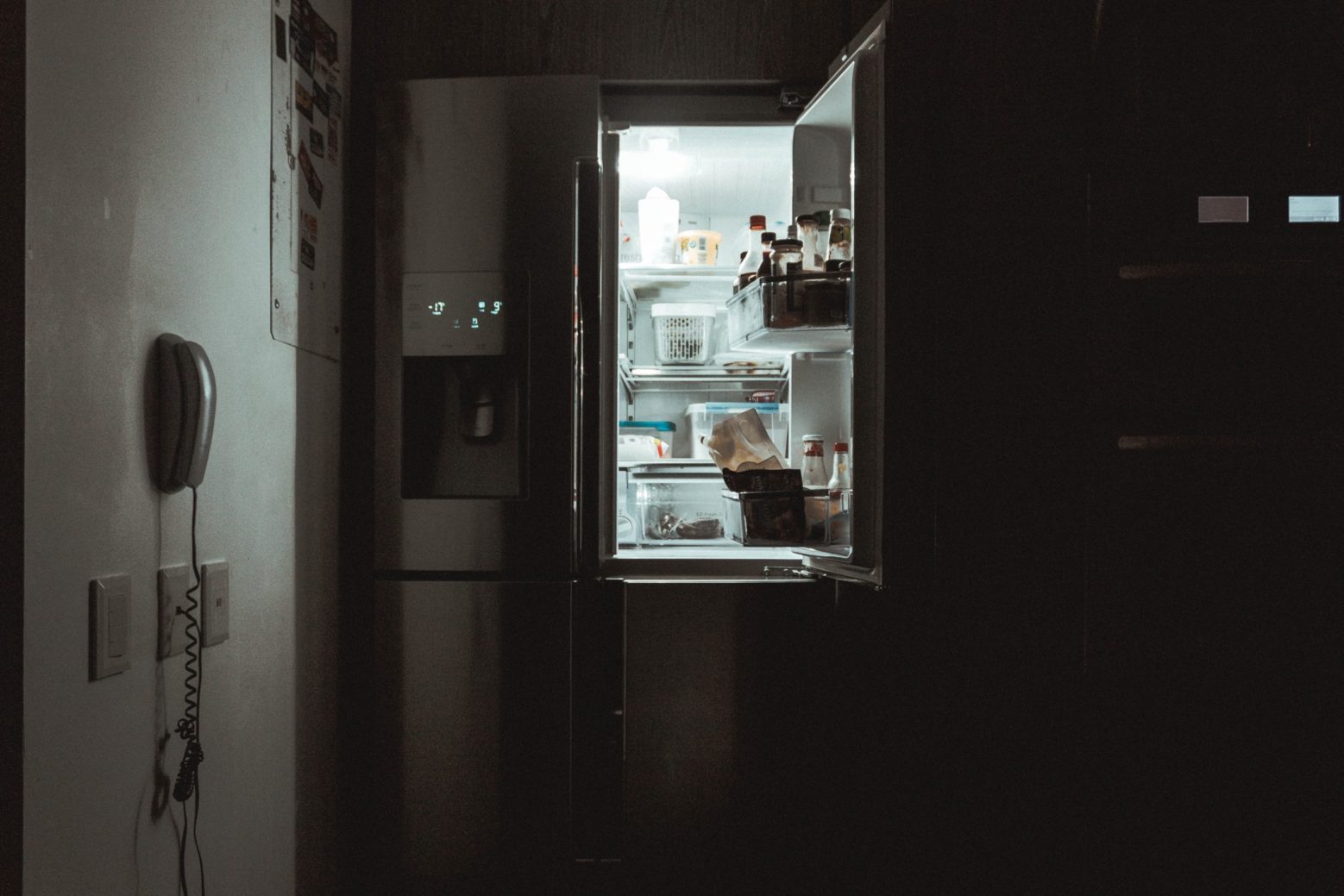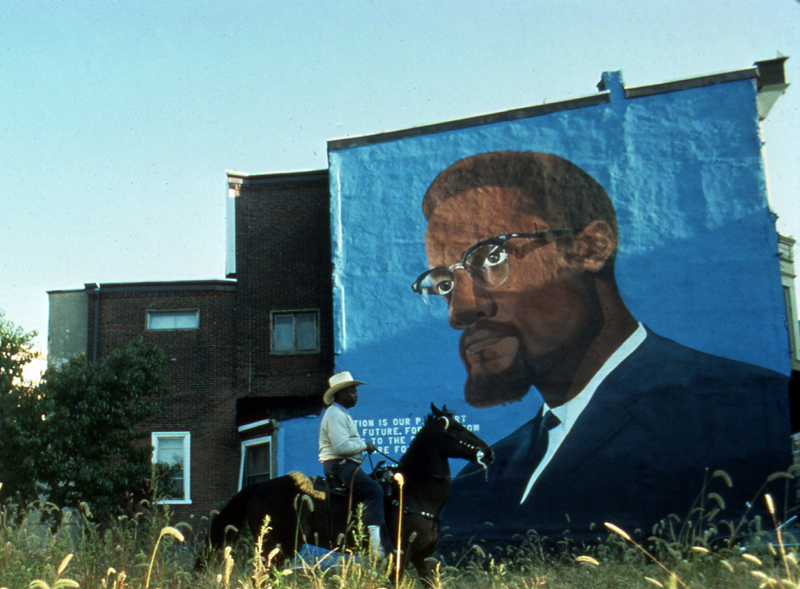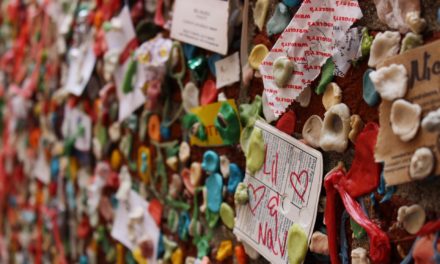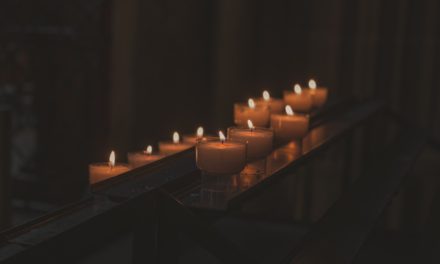Care
by Charlotte Hammond
On my mother’s first birthday since she lost her mind, I stare into the blue light of the fridge. I’m starved. My eyes first land on a big, softening persimmon. I take it out and cut it into chunks and let my fingers get sticky with juice.
Then I decide to slice up one of the cucumbers I have to prepare for later. I listen for the thwack, thwack, thwack of the knife hitting the plastic cutting board wondering if it will stir my mother, but the apartment doesn’t move. On the cold cucumber rounds I smear cream cheese from a plastic tub and eat them cupped like chilled tacos.
These days my mother sleeps late. Till after eight some days. It should be a good thing. It seems unfair that old people, especially the restless ones, should have trouble giving into long nights of rest. That their bodies won’t let them take it easy and live in their dreams a bit longer. I should rejoice in those mornings without my mother, but they set me on edge a little. I’m the one to greet her in the morning, where it used to be the other way around. Nowadays, I never know what I’m going to get.
After I’ve scarfed down the whole cucumber and a good third of the cream cheese, I look for more. I painstakingly take out all the ingredients to make my mother her birthday soup or even the components of the side dishes for the family luncheon. So much room for failure in this kitchen. I’m the opposite of my mother: an eater who dislikes cooking. For my mother, eating has always been the chore.
I unfold a carton of chocolate milk and drink it straight. I imagine my mother waking up to me and my horrible manners. The reaction I’d get from the new her. The loosened her. I picture my mother laughing, giddily, even a little complicitly, at the sight of her daughter chugging milk like a teenage boy.
Finally, I unlock a plastic container of leftover spaghetti my sister left last weekend. Grated cheese from 7-Eleven dresses it up a bit. Then I put on a pot of coffee, wondering if the smell might rouse the sleeping woman in the next room.
Slurping spaghetti, I bop around from foot to foot while I watch the coffee brew. I imagine singing Eoma the birthday song by Paul McCartney. She might like it. It might clue her into what’s going on today. Does the woman in the other room still love the Beatles? Then I take in the apartment a little, jolted at its clutter. Another thing for my sister to raise an eyebrow about. Avoid. I move to straighten an errant pile when the bedroom door opens.
The birthday girl emerges dressed in a powder pink nightgown baring all of her arms even though it’s January. She’s wearing my slippers, which look like fuzzy flower pots. Her doll-thin hair is matted, sort of pushed to one side of her head so that she looks like she’s been walking in a gale. She is frowning, as if the sight of the apartment and/or me in it is shooting dull pain into her temples.
Before I can rush to throw something over her shoulders, she locks my gaze and narrows her eyes. In that instant, I put down the spaghetti because I know something devastating is about to come out.
“Where’s your father? Did he go to the store?”
My stomach clamps down on the undigested noodles like a falling person gripping a slick railing.
“Eoma. Dad’s gone. You separated twelve years ago.” I pause, searching her stony expression. “We’re not in contact with him anymore.” Gradual clouds pass over her pale face. I can see she accepts it.
“Oh, yes. I did know that.” My mother drops her gaze and clears her throat. I go to her and give her a zip-up sweatshirt that was lying on the couch.
This isn’t the first time she has asked about my father. In fact, it happened earlier this week, again with a morning confrontation. Then he was “her husband,” which, legally, he still is. After I broke the truth to her again, her mouth twisted and she asked if he was still an accountant. As if his having a prominent profession could give her something. Some identity to hang on to. Her mind failing, she could still be the estranged wife of a respected accountant.
My mother could hardly keep track of where we lived, or what year it was, or the ingredients of her own invented recipes, the perfunctory tasks of living on her own. My father, on the other hand, could account for the finances of a large, nation-wide paint company. In her mind’s cloudscape, my father emerged out of a glimmering high rise, his brow bent over pages of numbers to choreograph and balance.
Truthfully, none of us knew what he did with his life these days. I moved my mouth into something I thought might resemble a calm smile. “Yes, Eoma. Dad is still an accountant at the paint company. He does very well.”
Now, I usher her into the bathroom with instructions to shower and dress while I make the seaweed soup for her birthday.
Like all my cooking, it is a sloppy process. I’ve added too little water to the machine and nearly botch the rice. Note to self: don’t screw that up later for the relatives. I gulp the coffee with a splash of chocolate milk in between swilling and seasoning the soup. It’s a pale green liquid covering shifting tectonic plates of darker kelp. I arrange my mother’s pills in a little pink dish.
It feels especially purposeful to have made my mother her own seaweed soup this year, the soup that restores the mother’s nutrients after childbirth, the soup that encourages us to be slippery like the seaweed. To slide into life as easy as possible. For the child’s sake and the mother’s. I pray she likes it.
Dressed in only a towel, Eoma places her pills in her mouth: one, two, three. My phone pulses and I know it’s my sister asking something inane. I angrily tidy the shoes in the vestibule. Did I make enough side dishes? What type of mineral water does our uncle prefer? As I type out a sarcastic reply, I hear my mother clang her spoon to the table. Shit, I think, the soup must taste awful.
“Hey,” she calls to me, her voice ragged. “What are you doing at home today? Why aren’t you at work? How on Earth do you have this much time to waste on me?” She locks eyes with me as if she’s trying to decode this conspiracy. I open my mouth to form an answer, but then I change my mind. Today isn’t the day to remind her why I’m here and not across town in a nice apartment, why her oldest daughter moved home, the reason everything I had got derailed. Today can’t be about me. Care is what you do despite your sunken heart.
I try to speak with the soft calmness of a hospital nurse or church lady, but it comes out in a stifled croak. I tell her that today is Sunday.
Her eyes in their soft, eggy sockets stay fixed on me like a suspect.
“And your sister teaches school.” Her voice less sharp, wavering on the last words. Is she reading me? Or does she remember?
I nod in her direction. She relaxes as if an invisible vice has released the top of her. She turns her attention to her spoon, returns to where she was before her mind skipped the tracks.
“Since when did you learn how to cook?”
As soon as my sister and her husband arrive, my sister drags me into the bedroom to give me a bag of useless trinkets. I’m in the middle of arranging side dishes when she does this. I’ve made my uncle’s favorite bean sprouts with sesame oil. I’ve made my mother’s favorite cucumber dish from the cucumbers I didn’t eat for breakfast. My sister’s beloved fish cake came from the 7-Eleven.
“Supplies,” my sister says, setting down the shopping bag near the wardrobe I now share with my mother. I roll my eyes at her.
“You know I’m not doing that. Please. Give it up.”
Jina’s new idea is that because my mother has lost her memory and her mind, we should reconstruct it for her in the form of a scrapbook. Of course, my sister had decided that she herself has no time to do this and me, unemployed—as if mom was not round-the-clock –would have infinite time and energy to assemble snippets of paper and photographs into an approximation of my mother’s sixty-two year life. When my sister had suggested the idea, I had wondered about what a crazy notion it was, though I was half dumbstruck. How were certain portions of our mother’s life supposed to get an editorial spread in Her Paper Memory?
“Do you want me to write on it?” I had asked my sister when she initially pitched the idea.
“No,” Jina says, “I want it to flow as a succession of images and shapes, like her own memory would. Of course, you’ll have to narrate a few parts,” she added. My mother asked me questions about herself at least a dozen times a day. Maybe Jina thought this book could save me time. More likely, though, it was so that mother remembered who Jina was.
One month ago, my sister took Eoma to the mall for Christmas shopping. It was something they had always done together. They drove to the Hyundai department store in my sister’s car. At one point, my mother stopped humming along to the ballads on the radio and turned to my sister.
“I’m sorry, but could you remind me of how we met?”
My sister nearly lost control of the car. “I almost killed us both and I almost wanted it that way,” Jina said when she told me the story, her face white as a bed sheet.
At the side of the road my sister sobbed. “Eoma, I’m your youngest daughter. You gave birth to me.” Last one out and first to slip away, I thought at the time.
“It’s her birthday,” Jina says, sulking into the shopping bag of scrapbook paper and tacky decals. “If you started the book when I asked you to, it could have been done by now.” I stay silent. My sister catches something in my face and runs her eyes around it. “Hey, are you overeating again?” she asks.
My uncle greets his sister like a long lost friend. He’s brought a box of pears wrapped in a bow for my mother and cheap beer, which is mostly for himself since even my sister’s husband is a demure drinker. I could tell that my mother was confused by her brother’s uncharacteristic warmth and even more puzzled by the gift. She donned a toothy smile, encouraging everyone to give in to the magnetic pull of the lunch table.
Playing my role as hostess, I give a little welcome speech. “We’re here to celebrate the birthday of my wonderful, generous, and hard-working mother, who was kind enough to eat my seaweed soup this morning.” My uncle feigns astonishment at my having cooked anything. My mother looks around the table, beaming nervously, as if someone had elbowed her and hissed in her withered ear “keep smiling.”
I prepared the main dish a day in advance. A braised chicken in a simple brown sauce. I studied the domestic queens of YouTube and gave it my best shot. Combating deep mortification, I set the chicken in front of my family. My sister begins murmuring measured praise when she’s interrupted.
“Certainly we should wait for my husband,” my mother says sternly, her face twisted in sudden concern. My brother-in-law’s face goes blank as a lampshade. My uncle laughs nervously and moves to pour his sister some beer, which doubly horrifies Jina. I know it will either have to be Jina or me who will remind her of reality, but I decide it’s Jina’s turn and start shoveling folds of bean sprouts and cucumbers into my mouth.
As the chicken is pulled apart and eaten, my brother-in-law and uncle take turns presiding over the table. My brother in law’s job sounds very middling. He does things with numbers, like my father. My uncle shares animated anecdotes about residents doing salacious things in the building where he is a super. One couple in their forties apparently started running a dirty webcam service for extra cash and got caught. Jina gives them credit for their creativity. After I serve some more helpings of chicken, my brother-in-law says his company may be hiring soon. Front desk. Part-time. I mutter a non-committal answer and avoid Jina’s gaze.
While clearing plates from the table, I notice my mother is gone. Even Jina, who had been gingerly sipping beer my uncle poured for her, didn’t recognize Eoma’s absence. It happened that way when she wandered off: time became a mysterious blip my mother could snatch for herself.
In seconds, I’ve scoured the apartment. Her winter coat, a cornflower blue, hangs by the doorway. Shit, I think.
Our street looks soft in the fading winter sunlight. It’s still. On the asphalt there’s a covering snow that must have fallen during the party. Shit, I think again, wondering about the state of my mother’s feet. She was wearing socks. No, just house slippers, no socks. I couldn’t remember. There are more than a few trails of footprints on the sidewalk. I try to replace gaps in my own short term memory and imagine what my mother’s mind was trying to piece together as she wandered along our dingy street.
Blocks away, I make out a smudge of silver, like the head of a dandelion. Speeding to a trot, I call her. My mother stands in front of a pet store with a pink neon bone in the window. On her feet are Jina’s Puma sneakers with the laces untied.
“It’s freezing out, Eoma,” I start to say. “You’re worried about me? Look at these animals,” she motions to three white balls of fluff doing an excited samba against the glass. Pink tongues trembling. An unfamiliar tone emerged from her. “They’re so lonely.”
She tells me she doesn’t want to go back inside. It’s uncomfortable, my mother says, having to socialize with people she doesn’t know well. I hold her close as we walk back through the cold dusk. Under her sweater, her spine is a series of pointed knobs, like a wide tooth comb.
Back at the house, I take Eoma into the bedroom so she can relax, swaddling her with an electric blanket she shrugs off with a tired giggle. Jina and her husband offer to take my rosy-looking uncle to the subway. “Try the book,” my sister breathes in my ear before sidling out the door.
The untouched birthday cake glows in the fridge, dotted with purple icing balloons. I cut myself a square piece and put it on a plate beside a bowl of seaweed soup. Surrounded by the untouched mess of the party, I bring the cold, slippery soup to my lips.
A day in the future forms in my mind, stark and spotlit like a scene from a play. A day that comes before her body fails, a day before the total reversal of parent and child. I don’t fear the moment my mother will ask me who I am. What paralyzes me is the part when I’ll tell her I’m her daughter and she will want to know more, and I won’t know where to start.
Charlotte Hammond is a writer living and working in New Jersey. Her work has previously appeared in Gone Lawn and Imminent Quarterly






